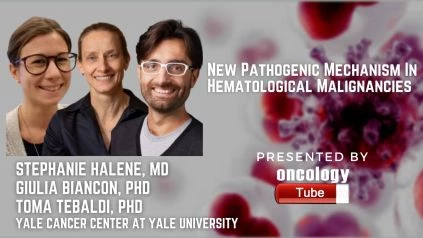Stephanie Halene, MD, Ph.D., Associate Professor of Medicine (Hematology); Chief, Hematology; Director, DeLuca Center for Innovation in Hematology Research, Yale Cancer Center; Assistant Medical Director CRSL, Yale Cancer Center at Yale University;Â Toma Tebaldi, Ph.D., Adjunct Assistant Professor, and Giulia Biancon, Ph.D., Postdoctoral Associate at Yale School of Medicine. In this video, they speak about Yale Scientists Discover a New Pathogenic Mechanism in Hematological Malignancies.
Â
Stephanie Halene, MD, Ph.D., cares for patients with hematologic malignancies and works to bridge the gap between the clinic and the basic science laboratories.
Toma Tebaldi, Ph.D., my research aims at understanding the RNA molecular mechanisms underlying dysregulation in human diseases, by combining experimental and computational approaches and with focus on alternative splicing events, binding of non-coding RNAs and mutant RNA binding proteins, RNA modifications (the epitranscriptome), translation dynamics and single cell expression data.
Giulia Biancon, Ph.D., my commitment to blood cancer research started in 2013 when I joined as a postgraduate student in the Hematology lab of Prof Corradini at the University of Milan in Italy. During my Ph.D. I focused on the study of multiple myeloma, integrating molecular and computational biology. I moved to Yale in 2018 joining the lab of Prof. Halene for my postdoctoral studies. Here I am focused on dissecting aberrant RNA mechanisms underlying myelodysplastic syndromes and acute myeloid leukemia. Since 2020 I am also one of the coordinators of the Yale Center for RNA Science and Medicine.

